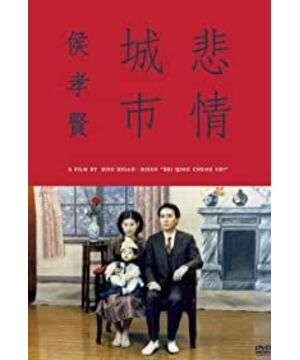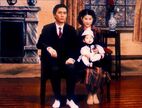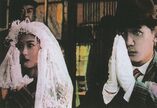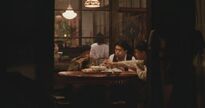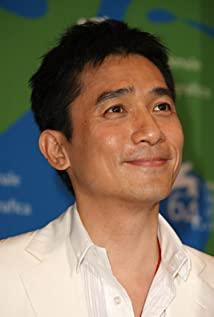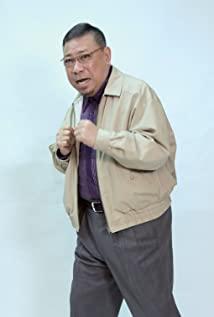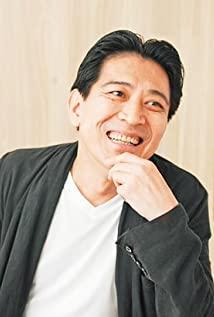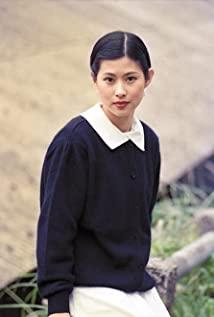There is no doubt that Director Hou's intention is to penetrate more of the breath and meaning of daily life through a realistic lens, so as to remind us that these stories are actually next door to our lives, rather than need to spend money to sit in the dark. watch on the screen. It is the instinct of the Chinese people for thousands of years to discover the universal meaning of stories.
Desolation is a word that Hou Dao summed up himself. Not only the meaning of light and shadow, but also the expectations behind all the performances and structures about the endless cycle of hits.
There is a little gossip at the beginning and end of the story: I saw one name, Zhan Hongzhi. It starts as a planner and ends as a supporting character. Only then did I know the concept and shape of Mr. Zhan who introduced the European and American reasoning system to the Chinese world. In an instant, I thought of Xu Jinglei, who was mixed with Meng Jinghui and Wang Shuo. (It was later seen elsewhere that the four intellectuals were Zhan Hongzhi, Wu Nianzhen, Xie Caijun (Tang Nuo), and Zhang Dachun. This...) The
story begins with a childbirth: the radio plays Yu Zhao, who surrendered to the emperor, while the boss wife in childbirth. While the audience and the characters were both anxious, a call came. The intertwining of the world, the city and the personal life begins now. The radio, which sounded incomparably distant, later influenced the fate of the entire extended family; the restless childbirth at that time was nothing more than a natural growth, but an opportunity for continuation.
This film, on the whole, has a very clear style and is obviously influenced by some Japanese citizen films. Like everyone's unanimous comments, Hou Dao rarely uses close-ups, and the rhythm is very slow, and most of them use fixed-position medium and long-range long shots. However, it is precisely this kind of fixed camera position, because the location of the building and the street is fixed, and it is entirely dependent on the director to dispatch the actors' movements and movements to reflect the flow of life and the emphasis on daily life, combined with the noise and restraint of almost real life. The asynchronous effect of sound and picture has fully delayed and foiled the upcoming dramatic plot. Moreover, the same camera position that appears in different time periods can easily reflect the flow of time and the change of atmosphere through the difference in light and clothing, and it is more suitable to point out the change of time in a more euphemistic way. It is in line with the concept of "time and space change". In several scenes, it can be seen that the director's fine compositional arrangement reflects the real sense of hierarchy. In addition, when Hou Hsiao-hsien performed the family's ritualized daily life scenes in the indoor drama, the actors' scheduling and movement were also clear, flexible and natural, without the smell of fireworks. Hou Dao is well versed in the inflection of Chinese culture, the more earth-shattering news, the more bland his performance. Earth-shaking national news is often broadcast on the radio; the characters' love, hatred, and hatred are summed up with silent subtitles because the protagonist is deaf and mute. There are several violent shots of slashing and death, either the occasional limbs exposed in the chaotic voices in the dark, or the small crowd slashed into a mass in the distance. The closer you get to the fate of a specific character, the closer the camera is to show the emotional response of the character in a specific scene. When the feelings have accumulated to a certain level, Hou Hsiao-hsien will arrange a very slow and quiet vision to calm and brew this emotion; when there is no way to let go, the camera will look directly at the entire vast and sparse island, and the thunder rolls. It is a very strong poetic temperament and compassion.
From the structure point of view, although the film has many clues, the structure is not chaotic at all. The opening is a big family facing great changes, like a big tree with branches and loose leaves; the eldest brother, as one of the protagonists, is specially responsible for dealing with the world's sophistication and dispelling the meaning of tragedy. In fact, there are several scenes where the eldest brother's straightforwardness is used to create a small burden and relax the audience's nerves. The third child is not doing a proper job; the fourth child, as a deaf-mute, first keeps aloof from the world, and then resolutely joins the revolution. In fact, it is a kind of delusion that ignores reality and clings to it. Starting from the doubts about the Kuomintang’s liberation of Taiwan from the drinking of the teachers, and from the third one returning from the army and being tempted to smuggle by the Shanghai guy, the story has entered a process of convergence: each branch is gradually reduced, and the boss tries to protect and restore the situation, but it is often not as good as The third brother was beaten into a fool after several twists and turns; the current situation was chaotic, the naive intellectuals died one after another, and only the fourth brother was shocked by the tragedy and joined the resistance movement. In the end, the story focuses on the family itself, and there is almost no suspense until the unexpected death of the boss. In the end, the camera falls on the dinner of three generations of grandparents, the old is numb, the middle is dementia, and the young is ignorant. All others involved in the story left the story either dead or in jail.
This brings together one theme: the alternation of regimes, the brutality and ruthlessness of the new rulers, the fierce conflict of interests between foreign and native cultures. It begins with a rich and varied life and ends with a lifeless and broken family, presenting a disparate tragedy.
At the beginning of the film, the director introduced the background of the story in a long paragraph in English: Japan admitted defeat in World War II, and the Kuomintang took over Taiwan; because the Kuomintang was stationed in Taiwan, a series of conflicts between locals and people from other provinces arose. In this passage, there is a very clear part of introducing cultural differences: people on the island speak Japanese and Hakka; people from other provinces speak Beijing accent, Shanghai accent, Cantonese accent, and candidates with accents from other cities and towns. Under such a background of the story, it is worth pondering and thinking about the setting of the protagonist, the fourth child, who is deaf and mute. However, subsequent stories prove that even deaf and mute people cannot escape the era of being arrested by tyranny and wantonly shot.
As far as performance is concerned, the actors in the film can be said to play in their true colors, which is quite moving. With this film, Chen Songyong won Taiwan's Golden Horse Best Actor, and he truly deserved his name. He showed his eldest brother Lin Wenxiong, who is honest, experienced in handling things, both in all corners of the world and caring for his family, to the fullest. He was recognized by Hong Kong and Taiwan film critics as an "outstanding actor who showed his true feelings in the face of all corners of the world's loyalty and family affection". Xin Shufen can be said to be a classic actor that Hou Hsiao-hsien can't meet or find. He fully uses his elegant and demure temperament to create a beautiful character with a quiet, stable picture and plot atmosphere. These two characters, under the control of director Hou Hsiao-hsien, move and remain still, and relax, like the black and white of Tai Chi, throughout the entire film. And Tony Leung, who plays Chen Songyong's fourth brother and Xin Shufen's deaf-mute husband, can also make full use of body language and flexible facial changes to convince a simple and peaceful ordinary young man who has gradually embarked on the road of resistance. Not easy. In my opinion, although Liang is an excellent and talented actor, his performance is too rich and agile, which is not suitable for Hou Hsiao-hsien's life-like movie style.
Thanks to Mr. Wu Nianzhen and Zhu Tianwen, the lines of the whole film are very authentic and authentic, full of emotional power and penetrating power.
About youth and love:
with transport of
cherry blossoms
despite flying go
I'll follow all the same
Wu was shot last words:
students from the motherland
dead return motherland
and death destiny
no want no-mind
are of the self-Japanese haiku and Noh, It not only fits the cultural imprint of the times, but also deeply moving.
The lives of the characters in the sad city are not actually in the city, far away from those who decide the style of the flag, the name of the country and the order. However, their lives are inevitably driven by distant cities, like the corners of a pond still shaken by the waves of a torrential rain.
In that era, as a deaf person, even if he didn't listen or speak, he couldn't help but watch. As long as he breathed and lived, he had to bear witness to the tragedy. The victors shouted liberation and progress. To the common people who only wanted to live a stable life, they couldn't understand the meaning at all, and they were like beasts making strange noises.
Decades have passed, and Director Hou's films finally take on a different meaning. Hou Dao implicitly talked about the strict control at that time; now, looking at mainland China, dozens of ethnic groups are scattered in the vast land, and various policy changes, social movements, cultural revolutions, population migration, ethnic integration, and changes in dynasties have brought about The cultural conflict, repression and resistance of the people are still missing.
View more about A City of Sadness reviews


